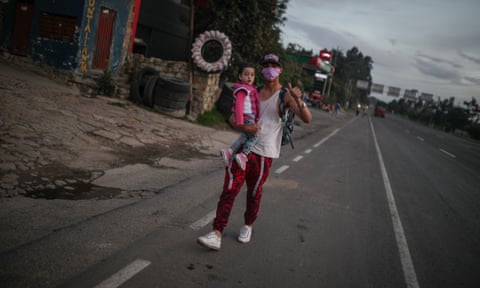Jenny Salazar fled her native Venezuela last year, trudging hundreds of miles down a motorway to Colombia’s capital with only a suitcase and her nine-year-old daughter in tow.
“It was tough, walking up and down those mountains. But it was the only way we could survive. Staying in Venezuela meant we would die,” the 34-year-old street vendor said of her economically ruined homeland.
But this week, Salazar began retracing her journey through the Andes, one of hundreds – perhaps thousands – of Venezuelan refugees and migrants now heading home after their new lives were upended by a coronavirus pandemic that has claimed more than 100,000 lives.
“My girl is a little warrior,” Salazar said as the pair trekked towards the Venezuelan border, a teddy bear and a gallon of water strapped to their bag.
With many South American countries now under partial or total lockdown, exiles such as Salazar have found themselves unemployed and roofless.
Some see returning to the very crisis they had been trying to outrun as their only option – and for Salazar that means going back to her home in the western state of Apure.
“I wanted to go back to Venezuela this year – but not like this,” she said as she sat on the side of the six-lane highway running north from Bogotá. “I imagined being sat on a bus, watching a film, with my daughter sleeping next to me.”
Venezuela’s authoritarian president, Nicolás Maduro, who has spent the last 15 months resisting a US-backed campaign to topple him, has seized on the homecoming as proof of his revolution’s resilience, even though it represents just 0.03% of the total exodus.
The UN says more than 4.5 million Venezuelans have fled abroad in recent years to escape an economic depression unprecedented in modern history outside of a war zone.

In a broadcast last week, Maduro claimed returnees were fleeing the “savage capitalism” and xenophobia of “fascist” foreign lands whose leaders had conspired to overthrow him.
“They want to come back … and I say to them: ‘Brothers and sisters! Fellow countrymen and women! Welcome! The homeland welcomes you with open arms,’” declared Maduro, who said he expected 15,000 Venezuelans to return from Colombia, Ecuador and Peru.
Maduro claimed more than 1,600 had arrived last weekend and said border officials had instructions to greet them with “love and affection” as well as blood tests to prove they did not carry coronavirus.
So far most returnees have come from Colombia, where nearly 2 million Venezuelan have sought shelter.
But Luzdey Olivo Rodríguez, a Venezuelan social worker in Ecuador, said migrants were also abandoning that country’s largest city, Guayaquil, where coronavirus has killed hundreds.
“Lots of people are going back,” said Olivo, blaming the “despair” of those who were completely dependent on Guayaquil’s informal economy, selling food, clothes or mobile phone cases. “They have no way to survive,” she added, warning of the perils of making such a long and perilous journey during the epidemic.
A federal police source on Brazil’s northern border with Venezuela said they had also noticed Venezuelans returning, albeit fewer. Between 10 and 20 Venezuelans were crossing each day, with some saying they wanted to care for relatives during the health crisis.
Others were still trying to flee into Brazil down an Amazon road dubbed the Hunger Highway but being refused entry or deported. Brazil’s President Jair Bolsonaro – who is part of the coalition trying to unseat Maduro – closed the border on 18 March in a bid to halt the virus’s spread.
Maduro said migrants who tested positive would be sent to hospital while those who didn’t would be quarantined for two weeks in hotels. “We are taking all the preventive measures to ensure no positive cases get into Venezuela,” he said.
But David Smolansky, an exiled opposition politician tasked with defending Venezuelan migrants, claimed hundreds of returnees, including pregnant women and newborns, were being herded into quarantine in filthy government installations on the border. “These Venezuelans are being treated like cattle,” he tweeted.

Tomás Guanipa, who represents Venezuela’s opposition in Colombia, accused Maduro of creating “concentration camps”.
Marianne Menjivar, the International Rescue Committee’s Colombia representative, said the reverse migration was a worrying trend. “The regional instability of these people walking around flies in the face of everything we know on how to prevent the spread of this pandemic.”
As William Sánchez started his month-long slog home from Colombia to Venezuela’s Aragua state this week, he said no other paths were available.
“We don’t want to go back – but what choice do we have?” he asked as his wife, Claudia Fernández, rummaged for a raincoat in their decrepit red suitcase.
The couple had both lost jobs as clerks in Bogotá and been evicted from their rented home. “At least we have family to stay with [in Venezuela],” Sánchez said, his voice muffled by a dirty surgical mask. “We can worry about food and the virus later.”
In Briceño, a satellite town 15 miles north of Bogotá, police picked up Venezuelan migrants and shuttled them along the road. “Just this morning we’ve ferried 80,” an officer said as he helped fill the back of his Nissan van with luggage.
The officer admitted police had orders not to use official vehicles to transport migrants. But what else could he do? “When you see someone in need, you help them.”
After dropping six migrants and their bags at a toll booth where they hoped to hitch a ride, the officer and his partner drove to a roadside store to buy disinfectant.
They fumigated the vehicle’s seats before heading back towards the capital to collect another load.
